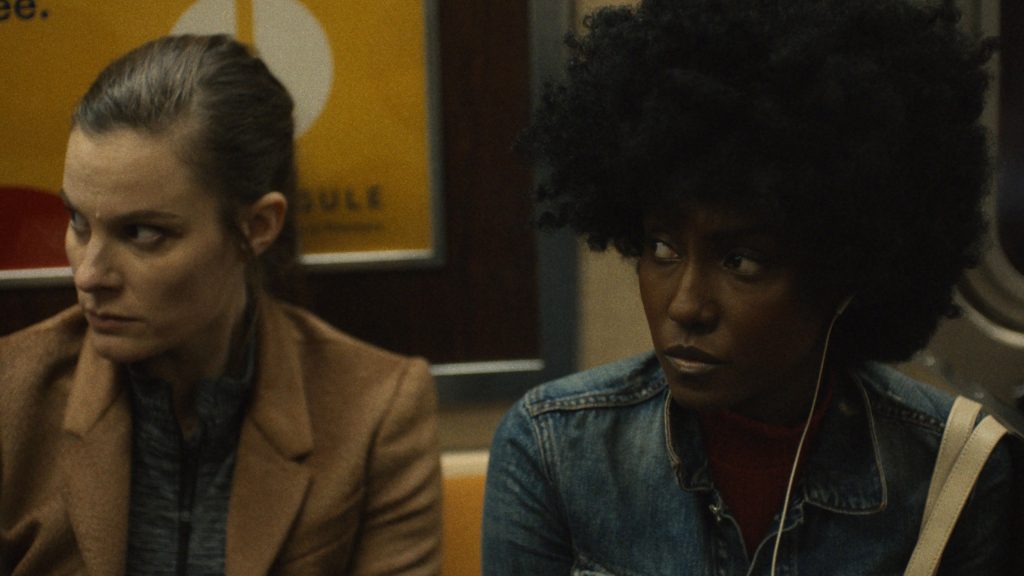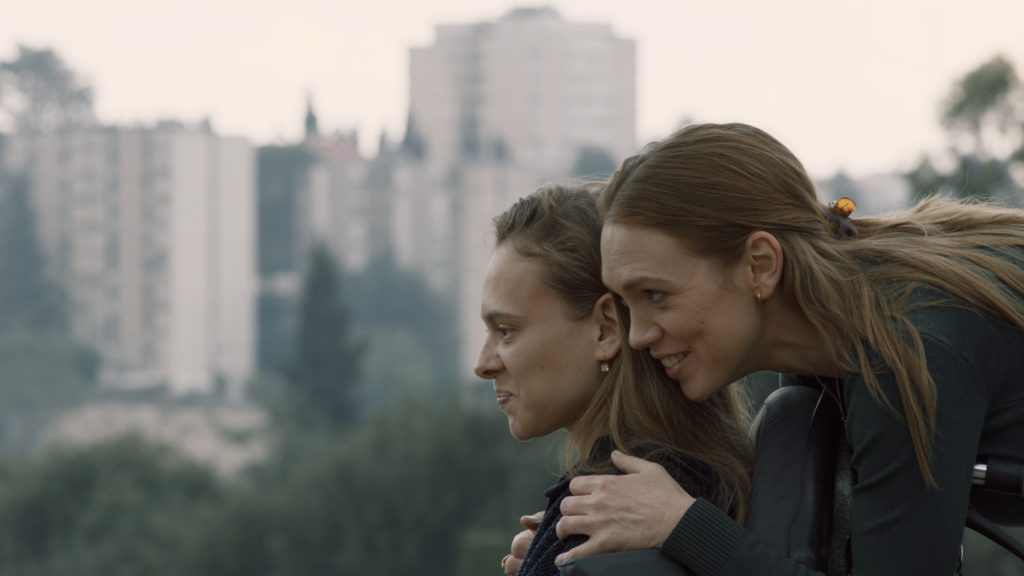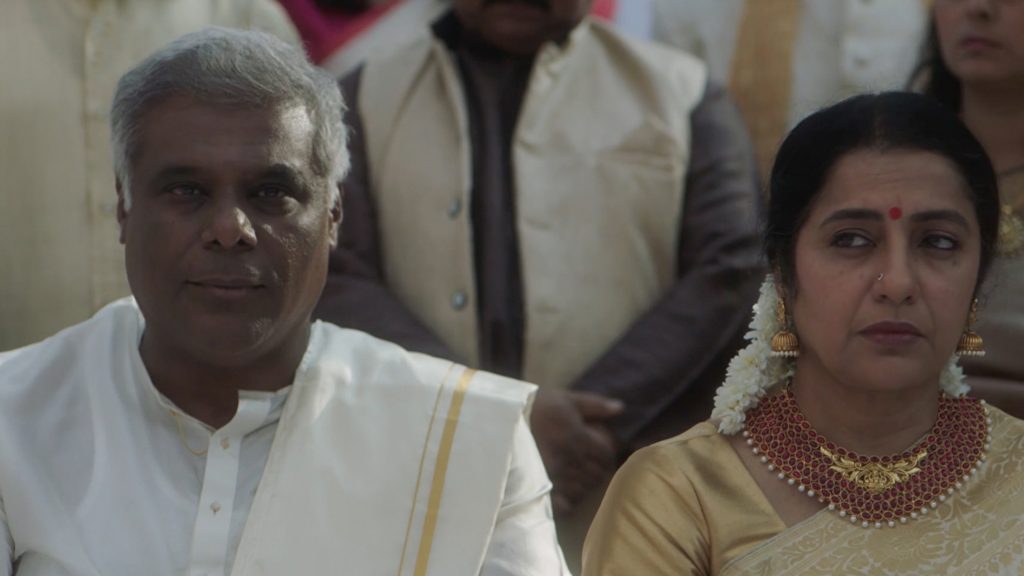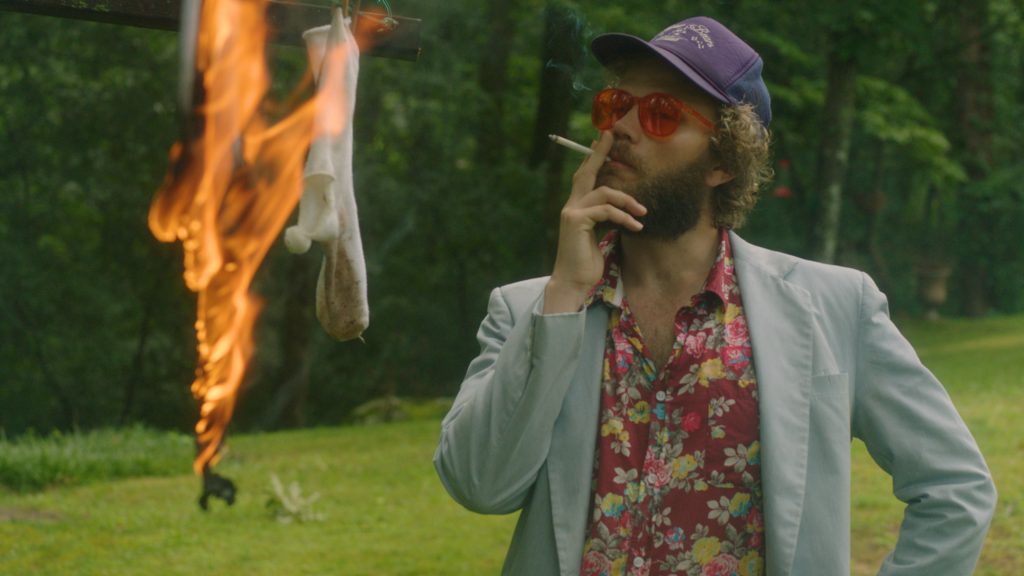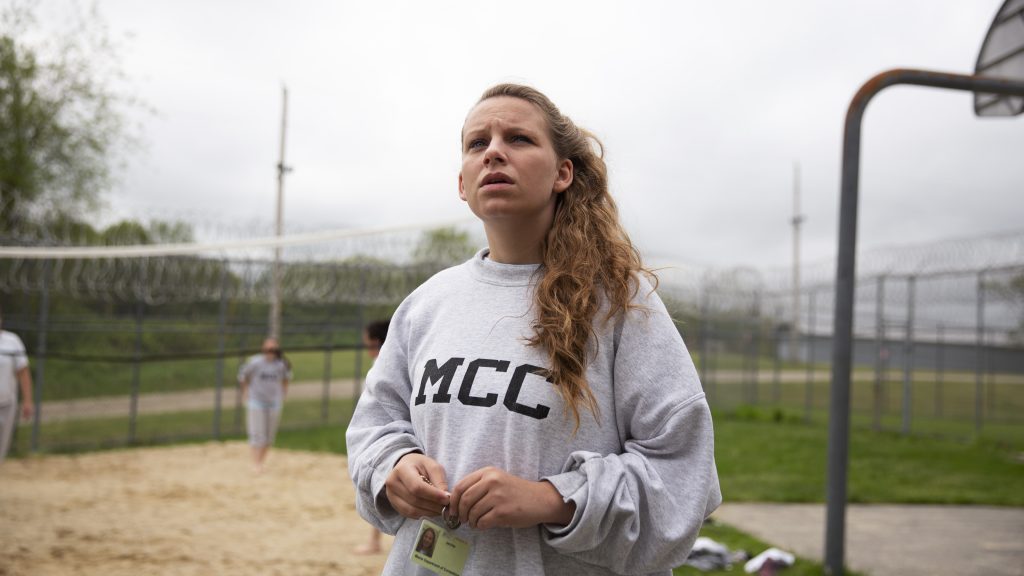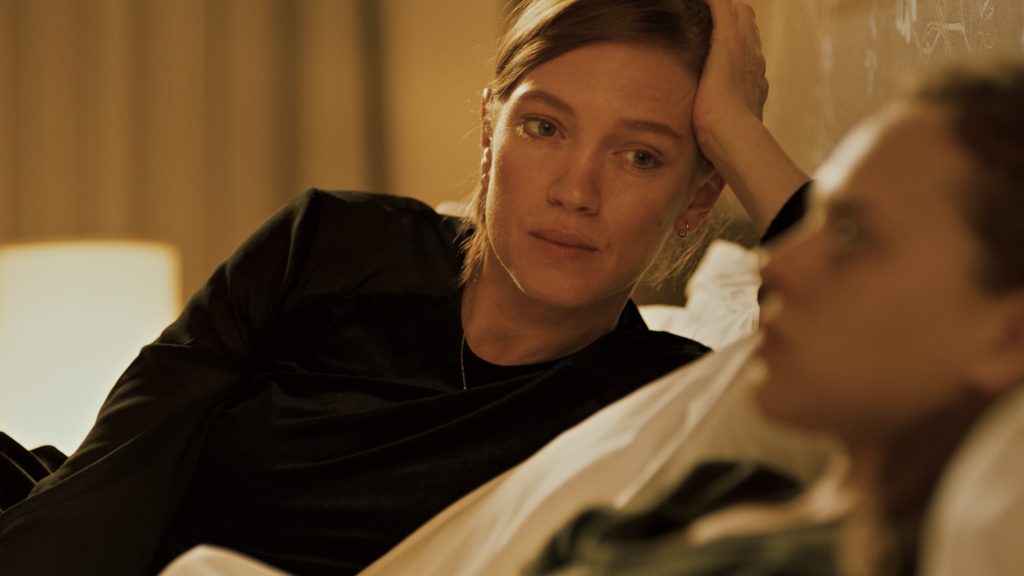May 1, 2020
by Carla Hay
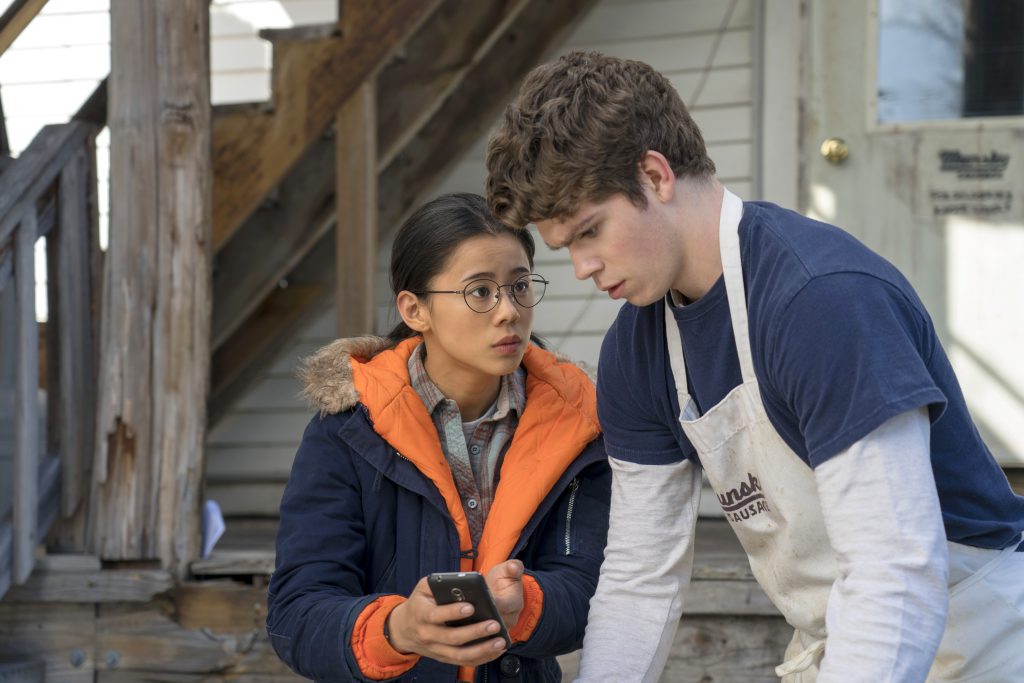
Directed by Alice Wu
Culture Representation: Taking place in the fictional small town of Squahamish, Washington, the romantic comedy “The Half of It” tells the “Cyrano de Bergerac”-inspired story of a love triangle between three middle-class teenagers—one Asian female, one white male and one Latina female—who are in their last year of high school.
Culture Clash: The Asian girl and the white guy are both romantically interested in the Latina girl, but because they all live in a religious and conservative community, the Asian girl is a closeted lesbian.
Culture Audience: “The Half of It” will appeal mostly to people who like well-written romantic comedies that follow familiar tropes, but have characters and dialogue that usually aren’t seen very often in movies of this genre.

On the surface, the romantic comedy “The Half of It” might seem to be a lesbian twist on “Cyrano de Bergerac,” the 1897 play about a man (the title character) who helps another man write love letters to a woman while secretly pining for the woman himself. However, “The Half of It” (which has a girl in the Cyrano de Bergerac role) is less about who gets the girl in the end and more about what the main characters find out about themselves when it comes to pursuing love.
“The Half of It,” written and directed by Alice Wu, is her first film since her 2004 debut feature film “Saving Face.” Loosely based on Wu’s own experiences, “The Half of It” was worth the long wait for Wu to make her second feature film. The 2020 Tribeca Film Festival jury must have also felt the same way, since “The Half of It” won the top prize (Best U.S. Narrative Feature) at the festival.
Most romantic comedies about teenagers are either one of two extremes: overly sweet or very raunchy. “The Half of It” is neither, although there are some melodramatic moments in the film that veer into some well-worn territory that every romantic comedy seems to have when secret feelings are revealed. Even with these borderline cliché scenes, the rest of the movie is so charming that even the grouchiest cynics might find something to like about the film.
The movie’s central character, Ellie Chu (played by Leah Lewis), would count herself as one of those grouchy cynics in the beginning of the story. The opening scene has Ellie in voiceover mentioning the Greek mythology of soul mates being conjoined in twos and then being split apart, and there is a constant search for people to find their “other half.”
Ellie—who’s a Chinese American student in her last year at high school—makes this wry comment about this “other half” mythology: “Of course, the ancient Greeks never went to high school, or they’d realize that we don’t need the gods to mess things up for us.”
She adds, “If you ask me, people spend far too much time looking for someone to complete them. How many people find perfect love—or if they do, make it last? More evidence of Camus’ theory that life is irrational and meaningless.”
It’s clear at this point that Ellie has above-average intelligence, compared to other people in her age group. She’s smart and funny—but a misfit at her school and in her community. She lives in the small, conservative fictional town of Squahamish, Washington, where the population is predominantly white and Christian—and Ellie is Asian and an atheist.
She doesn’t really have any close friends, and she sometimes gets racist taunts from other students who mock Ellie for her last name. Some of her fellow students also use her, by paying her to do their homework for them. Although she’s an academic whiz, Ellie also has a very artistic side to her: She sings, plays guitar and piano, and writes her own songs, but she’s too shy to sing her songs in public. Ellie plays keyboards in the school’s music group, which requires that all of the group’s class seniors participate in a talent show to spotlight their individual talent. It’s a spotlight that Ellie is dreading.
Ellie has a part-time job working at a booth at a train station. She spends most of her free time alone or with her widower father, Edwin Chu (played by Collin Chou), a Chinese immigrant who has a Ph. D. in engineering, but he has trouble finding work in the United States because he doesn’t speak English very well. It’s also clear during the course of the movie that Edwin is depressed over the death of his wife. The movie doesn’t mention how she died, but her passing has also deeply affected Ellie, who hides her pain with a mask of sarcastic wit.
Because of Edwin’s inability to find steady work, Ellie and her father are struggling financially. It’s one of the reasons why she plans to attend college close to home, instead of Grinnell College, a private liberal-arts school in Grinnell, Iowa, that Ellie’s English teacher Mrs. Geselschap (played by Becky Ann Baker) has been encouraging Ellie to attend. Mrs. Geselschap is a Grinnell alum, and she wants to write a recommendation letter for Ellie to attend Grinell, but Ellie declines the offer because Ellie has no plans to apply to that college.
One day, while Ellie is riding her bike, one of the school’s football players named Paul Munsky (played by Daniel Diemer) accidentally knocks her down. After a profuse apology, Paul introduces himself and asks Ellie to write a love note to Aster Flores (played by Alexxis Lemire), a pretty, popular and smart classmate whom Paul wants to be his girlfriend. Paul, who is a nice person but definitely not articulate, offers to pay $50 to Ellie for the task.
Unbeknownst to Paul, Ellie has a secret crush on Aster too. Ellie immediately refuses to write the note for Paul because—unlike doing homework for other students—Ellie thinks that writing a love note for someone else is too personal. Ellie quips to Paul when she turns down his request: “Get a thesaurus. Use spell check. Good luck, Romeo.”
But when Ellie and her father’s financial problems reach a point where their house’s electrical power is going to be shut off—and wouldn’t you know, the power company needs a minimum of $50 to not shut off the power—Ellie reluctantly agrees to write one letter for Paul. He’s shy about approaching Aster because she’s already dating Trig Carson (played by Wolfgang Novogratz), a handsome but very conceited classmate who’s also very popular at school. Trig is the kind of guy that many people (including Trig) expect Aster to marry someday.
Paul is also intimidated by the fact that Aster is the daughter of Deacon Flores (played by Enrique Murciano), who’s a well-respected and powerful leader in the community. Paul comes from a large, working-class family (that often bickers with each other), so he feels insecure that Aster and her family might think that Paul isn’t good enough for her. He’s also an aspiring chef, which isn’t the image that most people have of a football player. And so, some of the movie is about Paul trying to figure out how much he wants pursue that culinary dream and what becoming a chef will mean for his identity and other people’s expectations.
Aster is the type of person who’s nice to everyone, but her people-pleasing ways have come with a cost, since she’s often afraid of expressing what she really wants. Aster works as a waitress at a local diner, but she dreams of being a professional artist who paints, when her family’s expectation is that she should get married young and start a family. Aster and her family moved to Squahamish from Sacramento, California, so she’s still adjusting to living in a small town.
Meanwhile, Ellie has her own issues with trying to fit in with the community. She was born in China and immigrated with her parents to the United States when she was 5 years old, but she often lies about her background, by telling people that she was born and raised in Squahamish. And although she’s an atheist, she plays organ at the church where Aster’s father is the deacon. It’s implied in the movie that Ellie only spends time at the church to try to get close to Aster.
One of the reasons why Ellie is so attracted to Aster is they both share a love for the same type of literature. The two girls have a “meet cute” moment, when Aster accidentally bumps into Ellie at school and notices that Ellie is reading Kazuo Ishiguro’s “Remains of the Day,” which is also one of Aster’s favorite novels. It sparks the idea for Ellie to have Paul pretend that he also has a similar taste in books, even though in reality Paul has very little interest in reading.
What started out as one love note turns into a series of letters and text messages that Ellie concocts for Paul to woo Aster. There’s also a sequence where Ellie (pretending to be Paul) and Aster exchange messages by writing on a neighborhood wall—and somehow, they don’t catch each other in the act. Even when their graffiti is painted over, that doesn’t deter them from continuing to write messages on the wall. (It also gives Aster a chance to show some of her artistic painting skills.) Their graffiti messaging ends when an adult at a nearby business catches one of the girls in the act and scares her away.
Ellie recommends that Paul take things slow and approach Aster as an admiring friend. Aster starts to be won over by the charismatic correspondence that she thinks Paul is writing to her. But then, the moment comes when Paul wants to ask Aster out on a date, and the reality sinks in to Ellie that Paul and Aster could actually become romantically involved in real life.
If you know the story of “Cyrano de Bergerac,” then you can probably predict how “The Half of It” is going to end, but there are a few refreshing twists to the movie that aren’t very predictable. Lewis carries the film with an authenticity that makes her the clear standout in the cast. The other actors in the movie do a very good job too, but the Ellie character is the voice (and many people would also say the heart and soul) of the story.
What makes the “The Half of It” better than the average teen movie is that even though it’s a movie about teenagers, the movie isn’t just for teenagers, because it expresses many of the ageless emotions that people have about relationships. There’s plenty of cross-generational appeal in the movie’s soundtrack too, which ranges from Sharon Van Etten’s 2019 song “Seventeen” to Nick Cave and the Bad Seeds’ 1986 tune “The Carny” to ’70s nostalgia hits, such as Chicago’s “If You Leave Me Now,” John Denver’s “Annie’s Song” and Gordon Lightfoot’s “If You Can Read My Mind.”
Simply put: “The Half of It” is a much-needed, witty boost to the genre of romantic comedies, which have been struggling for years with mediocre and uninspired stories. And hopefully, it won’t take another 16 years for Wu’s next movie to be made.
Netflix premiered “The Half of It” on May 1, 2020.




